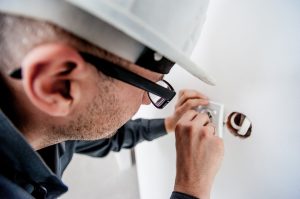Inside the insurance industry Artisan Contractors Insurance is commonly referred to as insurance for Artisan Contractors. What is an Artisan Contractor? That is a question many new business owners ask when applying for insurance the first time. These business owners frequently find out this is what classification their business is in. Artisan Contractors are a wide range of businesses that operate in different parts of the construction industry. Electricians, Plumbers and Painters are all included in this category.

Some common (NCCI) industry classification codes include:
- 5191 Electricians
- 5183 Plumbers
- 5537 HVAC Contractors
- 5221 Concrete Construction
- 5474 Painters
- 5437 Finishing Carpenters
They each have a similar, but different role within the construction industry and each type of work carries unique risks. From an insurers perspective they each carry their own risk and that is why they are separated into several separate class codes. Working with your insurance agent to make sure you are in the proper classification code can go a long way towards removing any headaches down the road relating to your commercial insurance policy.
Below are some common types of insurance recommended for Artisan Contractors Insurance:
General Liability
General Liability (GL) is typically the first line of insurance purchased by a business. GL is required by law in most states; additionally, businesses are often required to purchase coverage with most contracts for leases, loans, and work performed for others. GL exposures are primarily at the contractor’s office or shop and are generally limited due to lack of public access to the premises. Retail sales increase the possibility of customers slipping, falling, or tripping if customers visit office to view products. Job-site exposures include potential injury to the client or damage to the client’s property. Tools, power cords, building materials and scrap material, use of saws and other power or hand tools are all potential risks.
Workers’ Compensation
Workers’ Compensation Insurance is a state mandated insurance coverage required by nearly every state in the country. The basic purpose of Workers’ Compensation Insurance is to assure that injured workers get medical care and compensation for a portion of the income they lose while they are unable to work. Workers receive benefits regardless of who was at fault in the accident. Also, Workers’ Compensation Coverage prevents the employer from bearing the costs of injuries that occur during normal business operations.
Commercial Auto
Automobile exposures are generally limited to transporting workers, equipment and supplies to and from job sites. Hazards depend on the type and use of vehicles and radius of operation with the main hazards being upsets. Vehicles may have special modifications or built-in equipment such as lifts and hoists. If employees utilize their own personal vehicles for work related tasks then Hired and Non-Owned Coverage should be purchased.
Hired and Non-Owned Auto
Hired and non-owned auto insurance is commonly added (or endorsed) onto the commercial auto insurance policy. This endorsement adds additional coverages for the insured in the event there becomes a liability issue for their business for an automobile accident involving a vehicle they don’t directly insure. This coverage will pay for damages to a third party, on behalf of you the insured. This coverage kicks in if the business is held liable for an accident or injury caused by a vehicle they hired or a vehicle someone uses while performing work for a business. If you send an employee to run and errand on behalf of the business, your business is responsible for damages that occur.
Property Insurance
Commercial property insurance for business owners covers many types of losses and damages to a companies property. Property exposures are generally limited to those of an office, shop, and storage of materials, equipment, and vehicles. Property insurance typically provides coverage for events like fire, smoke, wind, hail and vandalism. Policies often have included or excluded coverages. Some natural disasters like earthquake or hail, may have separate deductibles.
Inland Marine
Inland marine exposures include contractors’ tools and equipment, including ladders and scaffolding, hoists, and portable welders, the transport of materials, and installation floater. Goods in transit consists of tools and equipment as well as products purchased by the customer for installation at the job site.
